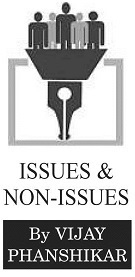We The People -- II
| Date :11-May-2019 |

By Vijay phanshikar
THESE words are very precious. For, through these words, “We The People Of India ... have given to ourselves this Constitution”. As the country nears the end of the current phase-wise election for the next Lok Sabha, the preciousness of the words in the Preamble comes alive in our minds. For, through the Preamble -- and also through the process of universal adult franchise -- we become the best and the biggest stake-holders in the process of running our own country. Hence the importance of that iconic expression “We The People ...”!
These three words have been interpreted variously by experts in the constitutional process and law as well as by common people. The best interpretation of the meaning of these words is that the expression empowers us to be the most important stake-holders in our country, our Mother India. Hence “We The People”!
The poeticism in this expression is obvious, and the sense of sovereignty and authority it lends to the people is phenomenally meaningful. Nobody can ever miss the metaphor, the talismanic value!
The process of casting vote, in other words exercising adult universal franchise, is very beautiful and offers each Indian an opportunity to endorse his or her stake-holding status. It is from this point of view that the international community admires India’s massive electoral process that involves one-sixth of the world’s population. No matter the actual percentage of the people that line up to cast their votes, the process goes beyond just a symbolism. Its practical value and utility have assumed legendary importance in the world’s democratic comprehension. For, when an unlettered person stands in line with a person of letters and exercises his or her right to choose people’s representatives on an equal basis, what is in evidence is the criticality of participation by all without exception on the basis of any barrier. The process not only does not recognise any barrier but also seeks to abolish all of those.
However, it is at this stage that we need to revisit the concept of stake-holders’ participation in the decision-making process. Though India has come a long way on the path of democracy through universal adult suffrage, the actual value of individual vote is no longer absolutely critical to the success of the Lincolnish concept of the system “By the people, of the people, for the people”, in the sense each individual Indian is yet to become an active as well as proactive member of the stake-holding component. And this reality is actually hurting the basic concept of one-person-one-vote without exception. This explains to a great extent rather indifferent participation of the people in the electoral process. And this needs to be changed.
This may not be described as democracy’s failure. Slow as the process is, it has taken all the democracies long time to enhance the stake-holding participation in the decision-making activity. Yet, it is time India hastened the speed of this process to make democracy worth its name as a people’s system.
The importance of hastening up of the process is visible all over the country. Even as the Government introduces various developmental schemes and plans, it rarely takes into confidence the actual stake-holders. Very rarely are people consulted whether they require a certain scheme or development and, if ‘yes’, in what manner. That is one of the major reasons why the people in the geographical domain do not seem to benefit actually from the process of development. They may get water for their farms all right. They may get electricity in their homes all right. They may get schools for their children all right. They may get hospitals in their areas all right. Yet, in actuality, they may have wanted something else in addition to all these! This inquiry is never done or encouraged. Most unfortunately, our rulers do not seem to realise this.
So, when we say that “We The People Of India ... have given to ourselves this Constitution”, those words are not actually, practically meant and are considered mere symbolisms. Unless this is changed into a condition in which the stake-holders have an actual say -- well beyond mere casting of votes and well beyond the elections -- nothing tangible would emerge from our democracy.
If we want to make the authoritative assertion “We The People ...” completely meaningful, then the political leadership will have to evolve a system that encourages common people to go close to them and speak straight into their ear, look straight into their eyes, and buttonhole them whenever it is necessary to ask straight questions. This will mean that our country will have to develop a system that will grant a closer and greater connect between the leaders and the people so as to have a continuous dialogue which is the core value of a barrier-less democracy.
If this is to be achieved fully, we -- the leaders and the led -- must remind ourselves of the actual importance of “We The People”!